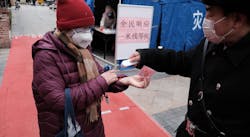As more manufacturers reopen their facilities, it is crucial to ensure that the facility is truly ready to operate within the new norm. Understandably, worker health is a key component.
This is where ThermalPass from Internet of Things Inc. is hoping to make a difference. ThermalPass is a non-imposing, unobtrusive medical grade sensor fever detection system that blends into any environment where people must walk through an entrance way, much like a low-profile metal detector. The system is made up multiple thermal sensors that scan an individual 20-times per second as they walk at a normal pace. Unlike thermal cameras, the sensors are more precise at reading body temperature since they respond to a very limited wavelength range, around 14 microns, which is what the human body generally radiates.
ThermalPass measures temperature from a distance by detecting an object's infrared energy. The thermopile sensing element, composed of small thermocouples on a silicon chip, absorb the energy and produce an output signal. Infrared cameras are not as stable or as accurate in detecting body temperature as thermophile sensors.
The system can instantly and quietly alert security personnel of any person with a skin temperature that suggests a higher-than-normal temperature, allowing staff to conduct a secondary temperature check.
Lende tells IndustryWeek, ThermalPass is built for easy assembly, mobility and minimal disruption while taking accurate thermal readings. The system also offers unique and distinctive competencies over other fever detecting devises since it uses thermal medical grade sensors vs. cameras that are less accurate, more expensive, and obtrusive to personal space. Since the system is not camera based, it does not invade a person's privacy, collect individualized data, or identify people.
“ThermalPass’ sensors are designed to measure temperature from a distance by detecting an object's infrared energy. Our AI-powered system allows for fast, touch-free scanning of individuals as they pass through the device without impeding walking speed while entering high-traffic public locations,” he says. “The system instantly and quietly alerts security personnel of any person with a higher-than-normal temperature, enabling staff to conduct a secondary check and maintain traffic flow.”
People will be concerned about public spaces for a long time to come, explains Lende. “As a society we will need to rethink how we manage risk, recognize certain trade-offs, and put safety measures in place to get the economy up and running again,” he says. “ThermalPass is positioned to help all types of corporations, manufacturers, and institutions to rebuild confidence as the world starts to recover from this unprecedented health crisis. It can play a vital role in protecting employees in the North American manufacturing sector and beyond.”
About the Author
Peter Fretty
Technology Editor
As a highly experienced journalist, Peter Fretty regularly covers advances in manufacturing, information technology, and software. He has written thousands of feature articles, cover stories, and white papers for an assortment of trade journals, business publications, and consumer magazines.

